- Home
- Aharon Appelfeld
Katerina Page 2
Katerina Read online
Page 2
One night he approached me, may God forgive me, and spoke to me in a voice that wasn’t his: “Why not sleep with Daddy? The house is cold.” His eyes were glassy, and a kind of wanton redness glowed in them. He had never spoken to me in a voice like that. “It’s good to sleep with Daddy,” he said to me again in the voice that wasn’t his. I felt in my heart that this was sinful, but I didn’t know for sure. I crawled under the table like a dog and didn’t utter a word. Father crouched on his knees and said, “Why are you running away from me? It’s your daddy, not a stranger.” Then he put his two huge hands on my shoulders, pulled me to him, and kissed me. He then got to his feet, made a dismissive gesture, and sank onto his bed, asleep. After that, he didn’t look at me again.
2
A FEW MONTHS AFTER my mother’s death, Father brought a new wife home. She was a tall, broad woman who never spoke a word. The mountain from which she came was embodied in her face: a cramped face, like a workhorse’s. Father used to talk to her in a loud voice, as though to someone deaf.
“What are you doing?” she would ask me in a frightening tone.
“I?” I recoiled in my great fear.
“You’ve got to work,” she said. “You can’t sit idle.”
I used to spend most of the day outdoors. Even then I knew that this life would pass away and that another life, different and distant from here, would emerge from it. Every night I used to see my mother in a dream, and she, as always, was busy with housework, debts, and sick cattle. “Mother!” I wanted to have her near me, but she, as in life, was angry at everyone. I told her that Father had brought home a new wife. She seemed to grasp the fact, but ignored it.
In the autumn, I left the house. “Where to?” asked my father.
“To work.”
“Be careful, and don’t step off the straight and narrow path,” he called, and without adding a word, he disappeared from my sight. My father was a powerful man; he didn’t dare strike my mother, but I heard that he used to beat his second wife fiercely. They told me that he changed in the final years of his life and started going to church on Sundays.
I can hear my mother’s presence simmering and hissing, but I see my father before me as though he has refused to leave this world. In the summer many years ago, my father once stood leaning on a long pitchfork and smacked his lips to the cows, as if he were blowing kisses to slutty girls. The cows looked at him and smiled, which tickled his fancy, and he kept on smacking his lips. A strange kind of intimacy heated up between him and the cows. That summer, when I was in the third grade, on my way to school I suddenly heard my father’s voice: “Where is she going?”
“To school,” Mother answered without raising her head.
“What good does it do her? They don’t learn anything.”
“You’re not a priest. The priest ordered us to send the girls to school.”
“I say no.” A spirit of foolishness arose within him.
But my mother wasn’t alarmed, and she told him, “There is a God in heaven and He is king and He is the father, and we are ordered to heed Him, not you.”
Mother was a strong and brave woman. I saw her courage once in the winter, when she fought with a horse thief and made him run for his life. But for some reason she did not bequeath that courage to me. I was afraid of every shadow and listened for every sound; at night, even the crickets would alarm me.
This isolated place gave me no joy, but my first memories are still crystal clear: the rains, for example, the furious rains, or the harrowing rains, as they call them here. For my part, I loved the swift rains of the summer and the mist that used to rise from the meadows after a shower.
I never see my father and my mother together. As if they had never been together. Each of them had a special connection with animals. My mother took care of them devotedly but coldly; a healthy cow didn’t count for her. My father, in contrast, had a provocative relation with them, as if they were women to be seduced.
My mother was contemptuous of him for that behavior. After my mother’s death, I occasionally used to visit the chapel. She seemed to be lying on the large icon and praying together with the Holy Mother. I used to sit and watch the women praying, forlorn women. Sometimes they would hand me a piece of cake and bless me. There, among the smoky candles, the mildew, and the offerings I learned to observe people.
My father and his new wife did not, apparently, have a happy life. My mother’s spirit hovered in every corner. The new wife, the stranger, tried in vain to dislodge her from her domain. More than once I heard her grumble, “I can’t manage to do anything. In my house everybody was pleased with me, and here everything goes wrong.” Father, of course, didn’t accept these excuses, and every time bread burned in the oven or the food spoiled, he would hit her. She used to screech and threaten to run home. Years later, I heard that she dished out her fair share too, and when my father got sick, she treated him shabbily. There were rumors that she poisoned him. Who knows? She too is in the world of truth. If she sinned, she’ll pay her due. All accounts are settled in the end.
Something else, no small matter, used to be whispered about the house: my father’s bastards. Mother, of course, never forgave him, and she would often remind him of his sin. Each time she mentioned it, a peculiar smile would spread over his face, as if it weren’t a sin anymore but some trivial lapse. He had two bastards, from the same woman—a notorious harlot. In my childhood, I had seen them with my own eyes: sturdy young men, sitting on a narrow wagon and driving two skinny horses. Their way of perching on the narrow wagon struck me as funny. At a second glance, I discovered they looked like my father. “Mine die and the bastards live and thrive,” I heard my mother say more than once, gritting her teeth.
I left home with neither pain nor remorse, taking the back road everyone calls the Jewish road. Here, in the spring, but also in the winter, thin Jews used to gather, like grasshoppers, and sell their wares. They were one of the frightening wonders of my childhood. With their appearance, their way of sitting and bargaining, they weren’t like creatures of this world but like dark spirits scuttling about on spindly legs. “Don’t go there.” I heard my mother’s voice more than once. That warning just increased my curiosity, and every time they appeared, I would be there. They used to place their suitcases on the ground and spread out their wares in front of everyone. They had many ways of displaying: on ropes they would stretch from tree to tree, on improvised stands, on twigs, or simply on the ground. Those little, wrinkled suitcases proved to be full of treasures: colorful shirts, stockings, high-heeled shoes, and embroidered underwear—mostly women’s clothing and women’s finery. The women would swoop down on the garments and snatch whatever they could. I loved the city smells, cloaked in embroidered nightshirts.
If you ignored their frightening presence, the sight was diverting. I envied the women who used to bargain and buy new things, which would be wrapped in papers and cardboard. I didn’t have a penny. Once I asked my mother for a coin to buy a candy, and she scolded me, saying: “Don’t go there. The Jews will cheat you.” For hours I used to sit there. The peddlers were short and lively, and sometimes it seemed that they didn’t walk on human legs but rather on birds’ legs, so they could hop. Occasionally, a few peasants would appear abruptly and drive them away with whips. Once, in their flight, they left behind a pair of colorful stockings. When I showed them to my mother, she said, “Don’t wear them now. Save them for the holy days.”
Mostly, they would sell until evening. Then they would pack up the remainder of their wares and disappear. Once a Jew stood in our courtyard and offered us his wares. He was tall and thin, fringed with a black beard, and his neck was slender and long. Such a bare neck I had never seen in my life.
Afterward, I got used to them, and sometimes I would steal a piece of cloth or a little packet of candy. I particularly remember those thefts. There was a kind of victory over fear in them and a repressed joy, because you were allowed to steal from them—or as my mother used to say, th
eft from a thief is permitted.
Once my cousin Maria called to me, “The ghosts have arrived, and you’re here?”
“What ghosts are you talking about?”
“The ghosts with the suitcases.”
“You frightened me, Maria.”
“No need to be frightened,” she said coldly. “If you get used to them, you can get just what you need out of them.”
My cousin Maria was seven years older. She had worked for the Jews, and she knew them at close hand. She, too, like all of us, despised them, but she already knew that they weren’t openly harmful, that they didn’t poison you. She had dresses and underwear she had received from them. Once she brought an embroidered slip and gave it to me as a present.
My cousin Maria, may she rest in peace, was, God forgive her, as cold as ice. She didn’t know the meaning of fear. More than once I saw her stick a pig. She stabbed it without repugnance, and when the poor thing squealed, the expression on her face didn’t change. I once heard her cursing like a man. In the spring, I remember, she went up to one of the booths, chose a pretty shirt, and asked its price. The Jew named a sum.
“I don’t have any money today,” she said. “Next time I’ll pay you.”
“I won’t sell it to you,” said the Jew.
“What do you mean, you won’t sell?” She spoke to him softly and firmly. “You’ll be sorry.”
“I haven’t wronged anyone.” He raised his voice.
“If you don’t give it to me, my brother will slaughter you in the field,” she hissed.
“I’m not afraid,” the Jew shouted.
“Too bad to die for a shirt,” she whispered, running away with it. The Jew was about to run after her, and he did take a couple of steps, but he didn’t go far. That very night Maria explained to me, “The Jews, unlike us, are afraid of death. That fear is their undoing. That’s their weakness. We’ll jump off a bridge, but they won’t. That’s the difference, understand?” Maria, God forgive her, was a brazen woman. I myself was afraid of her.
In the village, the Jews used to appear at any time and in places you wouldn’t have expected them, near the lake or behind the chapel. The way they dressed made them very conspicuous. People would beat them or run after them, but, like the crows, they used to return, in every season of the year.
“Why are they like that?” I once asked my mother.
“Don’t you know? They killed Jesus.”
“They?”
“They.”
I didn’t ask any more. I was afraid to ask. They filled my dreams and blackened many nights. They always had the same look: thin, swarthy, hopping on birds’ legs, and suddenly rising up. Once, I remember, a Jew crossed my path in the middle of the field. He handed me a piece of candy, but so great was my fear that I took to my heels as though fleeing a ghost.
3
FOR TWO DAYS I trampled along. Fall was everywhere, rain and thick fog, but more bitter than anything was my father’s indifferent gaze. He abandoned me the way you abandon a sick animal that you don’t want put down right away. I wasn’t afraid of dogs. I was used to dogs. Every time a dog crossed my path, I stood still and made friends with it, for I understand the language of dogs. Judging by the way they bark, I know whether they’re content or angry. Wild dogs are mute. It’s hard to admit it, but we’re closer to animals than to humans. How many friends does a person acquire in his lifetime?
Between one rainstorm and another I would pick an apple or a pear, sit down, and try to cling to my mother’s memory. With no living soul nearby, a person draws close to the dead. My mother was a bitter woman in her lifetime, and in death her bitterness increased. More than once I asked mercy for her. Even in the world of truth she’s consumed by bitterness. Doesn’t death release us from our worldly accounts? Is everything we did, all the stupidity and filth, eternally bound to us? At night, I slept on a threshing floor or in an abandoned shed. From my earliest childhood I was accustomed to damp. Anyone who was born in a village knows that life is no party. I didn’t cry, and I didn’t blame anyone, but I lingered in the chapels and prayed. In the low, miserable chapels I learned how to pray. It’s hard to overcome pride and bend the knee, but when a person leaves his home and he has no other home in the world, his knees bend by themselves. In those poor chapels one learns how to approach one’s fellow man with a humble heart. Near those houses of worship, people handed me a slice of cake, a piece of cheese. I even got a coin from one peasant. Not every time. I occasionally saw a peasant woman come out of the chapel and fall upon her animal, beating it savagely, as if it weren’t a dumb beast but a notorious criminal.
I got to Strassov one night, a town consisting of a street and a busy railroad station. Maria had told me a lot about the town, but the sight of it wasn’t the way I had imagined it. The people poured out and crowded together near the exit, trains came and went, and tall, hearty men stood on the platforms and loaded sacks of grain.
“Don’t let them nuzzle you,” Maria had warned me.
Later, the station emptied out, the trains stopped running, the buffet was locked, and beggars and drunks popped out of the dark corners.
“Who are you?” one of the drunks asked me.
I was startled, and my mouth was dumb.
“From what village?” he kept asking.
I told him.
“Come with us; soon we’ll make some coffee.”
That’s how I got to know the night world of the railroad station. I was sixteen years old. They all called me the baby girl. That wasn’t an indulgent term there. If a person doesn’t give his due, he’s thrown out even from that cold, dark corner.
The next day I started washing dishes in the restaurant. Anyone born in a village is used to abuse. My mother beat me and my father didn’t spare my body, either. The restaurant owner was no better than they. In the evening, before paying me, he would feel my breasts. At night, many hands pawed me. It was cold in the dark, and the poor people’s clothing gave off a strong smell of damp. That foul smell came to cling to my clothes, too. “The body’s not holy, nothing will happen to you” said one of the drunks, reaching out and feeling my crotch.
The autumn turned out to be cold in the city. If I had had a room, I would have run away. A person without a room is like a stray dog. Everyone molests him. Having no choice, I used to sit, give them my things, and take theirs. I gave them the pennies that I earned, and they gave me a drink and a cup of coffee. I knew that drink deadens fear. My mother didn’t drink vodka outside the house, but during the dark winter days she used to sit alone and get drunk. When she got drunk, a hint of her youth would return to her face. She used to tell me about her native village, about the festivals and celebrations. I liked those rare hours very much, but the next day she would get up bitter and furious, casting her dread upon me.
In the Strassov railway station I learned how to swallow a whole drink in one gulp. After two or three drinks, you no longer feel fear or pain; you even enjoy the snuggling. In fact, nothing bothers you anymore; you lean your head against the wall, close your eyes, and sing.
One night, while I was still curled up with the drunks, my mother appeared to me, full of dread and anger.
“How did you get here?” I asked stupidly.
“You’re asking me?” she answered in anger.
I wanted to bend my knees and ask her pardon, but she disappeared, just as in her lifetime, furiously and with the rush of a person who doesn’t consider other people’s opinions. The next day I told one of the drunken women about the dream. She dismissed it with a wave of her hand and said, “Don’t listen to her. My mother used to torment me in dreams, too. I don’t believe in anyone, not even the dead. Everybody tries to take advantage of you. I wouldn’t go back to the village for anything. My body’s worthless in my eyes. If anyone wants to sleep with me, I let him. It’s warmer for both of us.”
So the days passed with no end in sight. The restaurant, for some reason, fired me. Now I didn’t have a penny. I would
steal whatever came to hand. I was caught more than once, and more than once they beat me, but I didn’t cry and I didn’t beg for mercy. I just gritted my teeth.
The promises the boys made to me were untrue. All that autumn they fondled my flesh, but when the cold got more bitter, they cleared out and left me alone with the sick and the old. Old people know when their end is near, and they curl up in a corner and wait for it silently. They say that freezing to death isn’t painful, but I have seen for myself how people writhe with the sting of cold and moan in agony. Who listens to them in a busy railroad station? Everyone goes his own way. That winter I cursed my father for not giving me a penny to live on.
But no darkness is absolute, though it sometimes seems so. While I was standing, abandoned in the busy railroad station, a short woman approached me and asked me simply, “Do you want to work for me?” I don’t know what an angel of God looks like, but that woman’s voice sounded to me like a voice from on high. From nearby, I could see that her face, wrapped in a kerchief, wasn’t soft. A kind of sternness was congealed in her eyes. I don’t like short people. They always instill a kind of restlessness and a guilt in me. “If someone gives you shelter in the cold, you have to love him,” I said to myself, and followed her.
“Where do you come from?” she asked.
I told her.
“And have you ever seen Jews?”
“Occasionally.” I smiled.
“I’m Jewish. Are you afraid?”
“No.”
“But first of all you must have a bath.” It had been months since my body had seen water. My clothes were sodden with the odor of damp, vodka, and tobacco; a person gets so accustomed to filth that he no longer notices it. Now, as I stood naked, fear coursed through my entire body and made me shudder. From every side Jews came up and stood next to me, and they were all in the same image: a thin man with a drawn sword in his hand. I fell to my knees and crossed myself. My sins had reached the high heavens, and now I was about to pay.

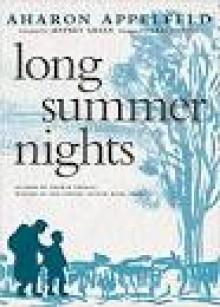 Long Summer Nights
Long Summer Nights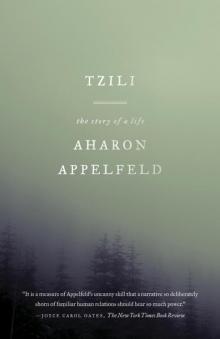 Tzili
Tzili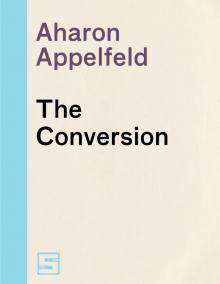 The Conversion
The Conversion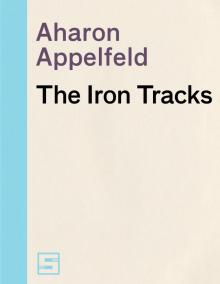 The Iron Tracks
The Iron Tracks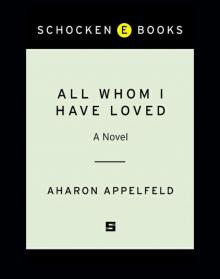 All Whom I Have Loved
All Whom I Have Loved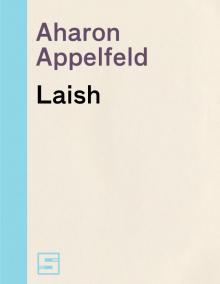 Laish
Laish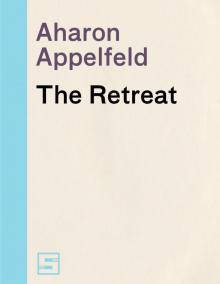 The Retreat
The Retreat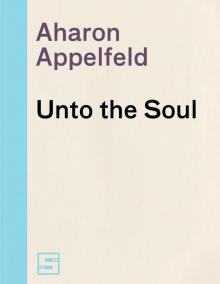 Unto the Soul
Unto the Soul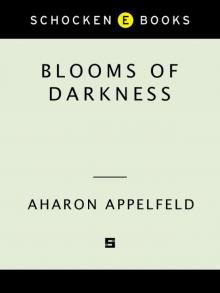 Blooms of Darkness
Blooms of Darkness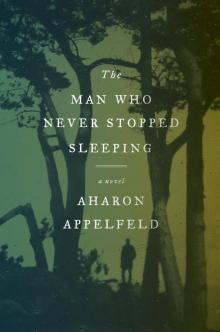 The Man Who Never Stopped Sleeping
The Man Who Never Stopped Sleeping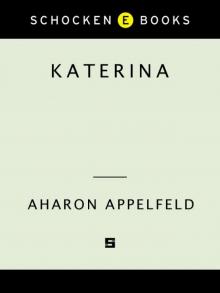 Katerina
Katerina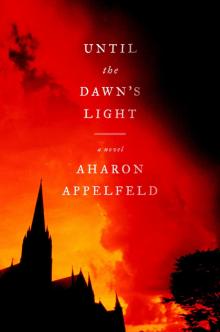 Until the Dawn's Light
Until the Dawn's Light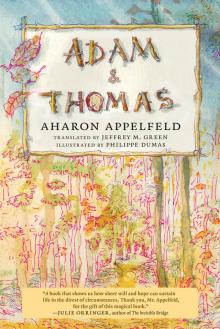 Adam and Thomas
Adam and Thomas Suddenly, Love
Suddenly, Love